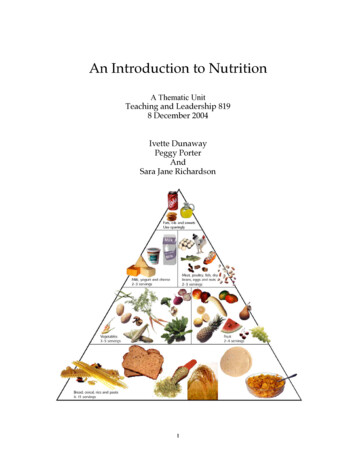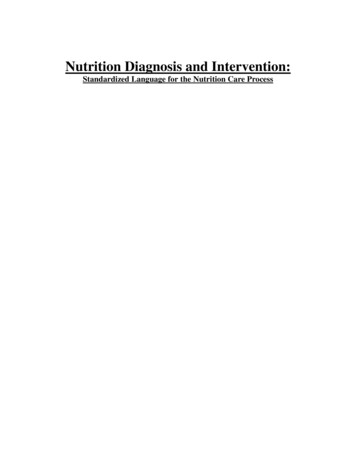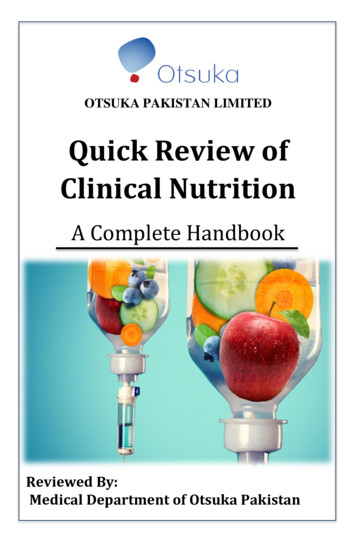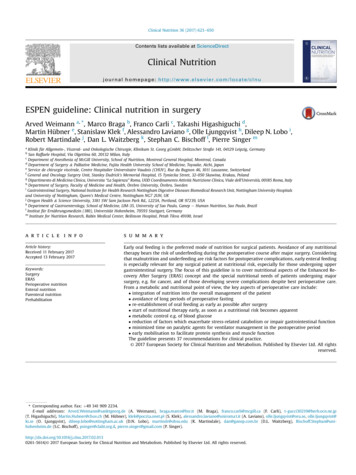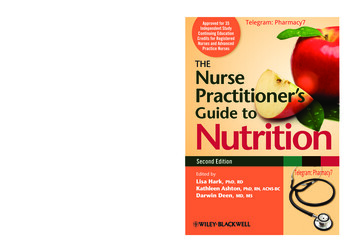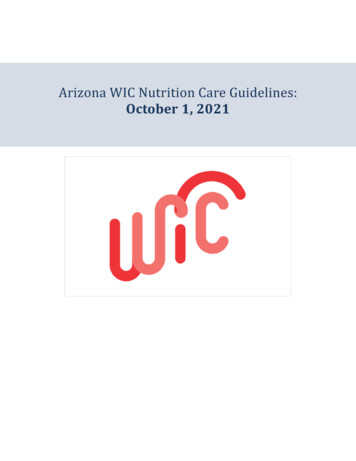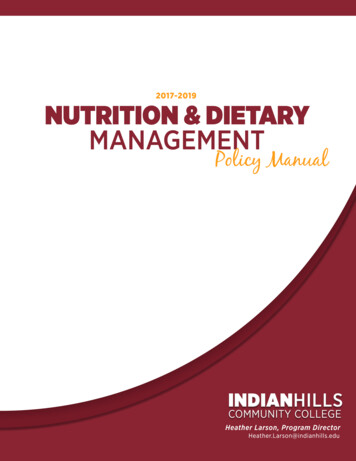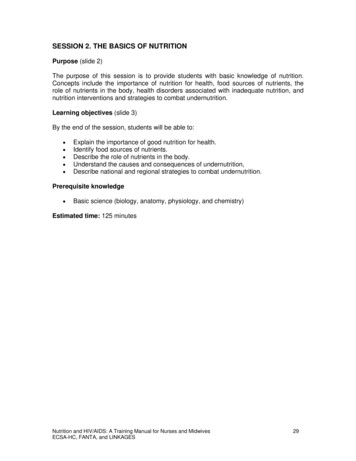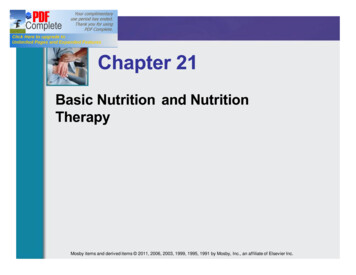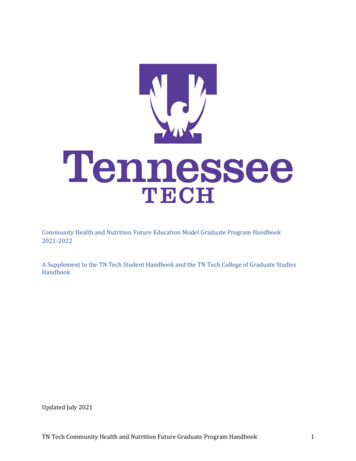
Transcription
Community Health and Nutrition Future Education Model Graduate Program Handbook2021-2022A Supplement to the TN Tech Student Handbook and the TN Tech College of Graduate StudiesHandbookUpdated July 2021TN Tech Community Health and Nutrition Future Graduate Program Handbook1
Table of ContentsContentPrefaceCompetency Based EducationAdmission RequirementsMonitoring Student PerformanceStudent RetentionSupervised Experiential Learning DocumentationPolicies that Differ Among Various TracksInsurance RequirementsLiability for Safe TravelInjury or IllnessDrug Testing and Criminal Background ChecksEstimated CostPolicy Regarding Students Replacing EmployeesCompensationProgram ComplaintsCredit Toward Prior Learning ExperiencesAnnual Assessment of Student LearningAdvisement and RegistrationProgram Retention and RemediationDisciplinary/Termination ProceduresAssessment of Professional/Ethical BehaviorGraduation RequirementsVerification Statement RequirementsVerification of Student IdentityWithdrawal and Refund of Tuition and FeesAffiliation Agreement/Preceptor Selection CriteriaProgram Schedule, Vacations, Holidays, and Leaves of AbsenceProgram of StudyProtection of Privacy of Student InformationStudent Access to Their Own FilesAccess to Student Support ServicesAssessment of Transfer CreditProfessional Dress Code GuidelinesSocial Media/NetworkingEmployment of 19192022232324242526262
PrefaceThe faculty and staff of the School of Human Ecology, Community Health and Nutrition FutureGraduate program welcome you. We are pleased that you have selected this program to pursueyour professional education and training.This handbook was developed to familiarize you with the program policies and procedures, whichyou are required to follow while you are a student enrolled in the program. The program handbookis not intended to be all-inclusive, but rather, to be used as a supplement to the Tennessee TechUniversity Student Handbook and the Tennessee Tech University College of Graduate StudiesCatalog .All of the policies and procedures apply to all students; however, this handbook delineates specificinterpretations as they apply to students enrolled in the Community Health and Nutrition FutureGraduate program. It outlines accepted policy, based on the program’s compliance to theAccreditation Council for Education in Nutrition and Dietetics (ACEND) and provides theframework within which the Program Director, University faculty and staff, and students can worktogether effectively.It is important that you read and become knowledgeable about the information presented in boththis handbook and the Tennessee Tech University College of Graduate Studies Student Cataloginformation. It is also important that you retain and use both handbooks as a basic reference whileyou are enrolled in the Community Health and Nutrition Future Graduate program.The Community Health and Nutrition Future Graduate program handbook is also available on ourwebsite: Community Health and NutritionThe Community Health and Nutrition Future Graduate program has been granted candidacy foraccreditation by the Accreditation Council for Education in Nutrition and Dietetics (ACEND) of theAcademy of Nutrition and Dietetics (A.N.D.), (ACEND@eatright.org), phone (1-800-877-1600 or 1800-877-1600 x5400), or mail (120 South Riverside Plaza, Suite 2190, Chicago, IL 60606-6995).https://www.eatrightpro.org/3
Competency Based EducationThe Community Health and Nutrition Future Graduate program is a competency-based educationprogram. The Accreditation Council for Education in Nutrition and Dietetics (ACEND) of theAcademy of Nutrition and Dietetics (AND) specifies that in competency-based education “the focusis on defining and measuring progress toward reaching the required competencies (the describedknowledge, skill, judgment, and attributes) needed to perform professionally-related functions.”Rather than offer traditional time-based learning and internship hours, this program focuses onstudent mastery of competencies and performance indicators outlined by ACEND.Admission RequirementsPer TN Tech’s College of Graduate Studies, admission to the College of Graduate Studies is open toanyone holding a bachelor's or master's degree from an accredited college or university. A foreigndegree must be equivalent to a U.S. Bachelor’s degree and must be accredited by its regional ornational accreditation agency or Ministry of Higher Education. Applicants should have completedundergraduate or graduate work of sufficient quality and scope to enable them to successfullypursue graduate study. Tennessee Tech University offers equal educational opportunity to allpersons, without regard to race, religion, sex, age, creed, color, national origin, or disability.Students are admitted to Tennessee Tech University through a cooperative effort of the GraduateCollege and the departments, colleges, and schools of the University. When the Graduate Collegereceives the student's application material, an official file is established. The department thenreviews the application file and makes a recommendation to the Graduate College. The GraduateCollege notifies applicants as soon as a decision has been reached.Applicants must submit the following for admission consideration:1.2.3.4.5.6.7.8.Online application for graduate admission and the nonrefundable application fee;Official transcripts of undergraduate and graduate credit from all institutionsattended;Undergraduate degrees accepted include: nutrition, dietetics, public health,kinesiology, health sciences, nursing, psychology, human development and familystudies, family and consumer sciences, and biobehavioral health. Otherundergraduate degrees not specifically listed here will be reviewed based ontranscript content;Prerequisite undergraduate coursework must include an introductory nutritioncourse (equivalent to Tennessee Tech’s HEC 2020 Nutrition for Health Sciences);one advanced nutrition course (higher level than introductory nutrition) must havea “B” or better in these two nutrition courses; and 8 credits of chemistry orbiology at the 3000/4000 level with a grade of “C” or better;Undergraduate GPA of at least 3.0 on a 4.0 scale;References (2)- when you submit your application provide contact information fortwo references. An email will then be sent to these references to complete anonline recommendation form. Your application is not completed until theserecommendation forms are submitted by your references;Questions- you will need to indicate on your graduate application if you areapplying to only the MS Degree in Community Health and Nutrition or both theDegree and the optional Experiential Learning Track- the Experiential LearningTrack has additional admission requirements;Resume – upload your resume (no more than 2 pages);4
9.10.Student Health Form;Personal Statement- upload a separate document which includes the following:state why you have the abilities, experiences, skills and knowledge to succeed inour degree program. Your statement should demonstrate why you are interestedin this graduate degree program and how it will help you meet career goals. Pleaselimit your statement to 1,200 words or fewer and use 12-point font, single-spacedformat.Specifically address the following questions in your personal statement:a. What are your professional goals; elaborate on future career plans and themotivation for pursuing a MS in Community Health and Nutritionb. In what ways will the MS in Community Health and Nutrition build upon yourcurrent skill setc. Why are you a good fit for this degree programd. Elaborate on your unique story which motivates you to seek this graduate degreeApplicants are selected on a competitive basis and, therefore, admission is notgranted to all applicants who meet only the minimum requirements.Individual program requirements are described in the Tennessee Tech University Graduate Catalogand on department websites. Requirements are subject to change. The Graduate College no longeraccepts hard-copy (paper) applications.The current rate for the nonrefundable graduate application fee is 35.00 for domestic applicantsand 40.00 for international applicants. Applications received without the application fee will notbe processed.All credentials become the property of the University and will not be forwarded or returned. If theapplicant does not enroll, credentials will be maintained in active files for 1 year, after which theywill be destroyed. After that time, candidates must reapply for admission and submit a new set ofcredentials if they wish to be admitted to the Graduate College. Students who do not enroll for a Fallor Spring semester must apply for readmission.In addition to the requirements for admission to the MS in Community Health and Nutrition Degreeas stated above, applicants who want to also be admitted to the Experiential Learning Track mustprovide:1. Evidence of Work/Volunteer Experience – documentation of 300 hours of work orvolunteer experience completed within two years of application. Of the 300 hours, at least200 hours must be in a nutrition- or dietetics-related field. You will be required to completethe Experiential Track Supplemental Form to document your experiences. This form will beuploaded with your Graduate application.2. Prerequisite coursework- for applicants who do not have a Verification Statement froman ACEND accredited Didactic Program in Dietetics (DPD) the following prerequisitecoursework must have been completed within five years from an accredited institution:a. Introductory Nutrition course equivalent to Tennessee Tech’s HEC2020 Nutrition for Health Sciencesb. Advanced Nutrition course (higher level than Introductory Nutrition)c. Organic Chemistryd. Microbiology or Biochemistrye. Experimental Foods, Food Preparation, Quantity Food Production, orFoodservice Management5
3. DPD Verification Statement- for students with a bachelor’s degree from an ACENDaccredited Didactic Program in Dietetics (DPD), you will be required to upload your DPDVerification statement with your Graduate application.4. Personal Statement: in addition to the questions listed above for the Personal Statement,applicants for the Experiential Learning Track should include why they are pursuing theRegistered Dietitian/Nutritionist (RDN) credential.5. Candidates for admission to the Experiential Learning Track will be required toparticipate in a virtual (face to face) interview via a video conferencing platform.Monitoring Student PerformanceThe TN Tech College of Graduate Studies has the following guidelines in place for probation anddismissal:A graduate student is required to maintain a cumulative grade point average of at least “B” on allgraduate courses taken as a graduate student. When a student’s cumulative average on courses fallsbelow 3.0, but not less than 2.0, the student will be placed on probation. If the cumulative averagefalls below 2.0, the student will be dismissed. If the term average, on all courses presented as part ofthe hours required for graduation, during any semester is less than 2.0, the student will bedismissed.A graduate student will be dismissed from the graduate program if any one of the followingconditions occurs:1. Two consecutive semesters of probation (summer semester is not included if the studentdid not take a summer course).2. The student's current or cumulative GPA falls below 2.0.3. Two grades of “F.”4. Two consecutive semesters of “No Progress” grades assigned in thesis or dissertationcourses.5. Some graduate programs may have more stringent dismissal criteria. Students shouldconfer with the department about such criteria.a. Please see the information below for information specific to the Community Healthand Nutrition Future Graduate program.A student who has been dismissed for unsatisfactory performance may request reinstatement,provided he/she produces evidence of extenuating circumstances that would prevent dismissal.The request must be approved by the department chair, director of the student’s graduate program,the dean of the college, and the Graduate Studies Executive Committee. The decision of theGraduate Studies Executive Committee is final. Details may be found in TN Tech Policy 281.This information can be found in the TN Tech College of Graduate Studies Catalog.With regard to both monitoring student performance in the Community Health and NutritionFuture Graduate program and retention and remediation procedures, the following sequence willbe initiated, based on whether the unsatisfactory performance is in the academic or experientiallearning setting.The Program Director, Experiential Learning Coordinator, and Preceptor have the responsibility formonitoring and reporting student performance. Regarding responsibility of reporting studentperformance in the Experiential Learning Setting:6
1. The dietitian or other preceptor in the affiliating facility will notify the student of his/herunsatisfactory performance orally and in writing.2. The dietitian or other preceptor in the affiliating institution shall notify the ProgramDirector and the Experiential Learning Coordinator program concerning student’sunsatisfactory performance;3. A conference will be scheduled and held to include the student, the affiliating facility’sdietitian or other preceptor, and the Community Health and Nutrition Future GraduateProgram Director and Experiential Learning Coordinator. At this meeting a written plan forimprovement will be developed and signed by all the parties at the conference identifyingthe specific knowledge and skills that must be satisfactorily demonstrated and the expectedtime frame for completion of the improvement plan. This timeframe may vary depending onthe experience, but students are typically given 2 weeks - 30 days to improve performancedepending on each student's situation. Ultimately the Program Director has the authorityand responsibility to determine if a student (after three attempts at remediation) will not besuccessful in the FEM program. This meeting may be held via Zoom;4. Students with minimal chance of success after three attempts at remediation will becounseled into different career pathways appropriate to their skill level and removed fromthe FEM Experiential Learning track.If the unsatisfactory performance is academic:1. the Program Director will explore tutorial support and remedial instruction available to thestudent. Student support services available to the student include those available throughTN Tech’s provision of free tutorial support to all of its students, including the Americanswith Disabilities Act: Any student who needs learning accommodations should inform theprofessor immediately at the beginning of the semester. The student is responsible forobtaining appropriate documentation and information regarding needed accommodationsfrom the TN Tech Accessible Education Center and providing it to the professor early in thesemester. The office information is as follows:Location: Roaden University Center, 112Phone: (931) 372-6119Fax: (931) 372-6378Email: disability@tntech.eduUnsatisfactory academic performance is defined by the College of Graduate Studies policiesnoted at the beginning of this section.5. If performance improves to an acceptable level during the agreed upon time allotment assigned by the involved parties, the student will be allowed to continue in the CommunityHealth and Nutrition Future Graduate program;6. Dependent upon what is needed by the student, further stipulations and remedial actionswill be developed to facilitate continued improvement in performance. Students withminimal chance of success after three attempts at remediation will be counseled intodifferent career pathways appropriate to their skill level and removed from the FEMExperiential Learning track.7. If the performance issue is not academic (unethical behavior, substance abuse, etc.), thestudent may remain in the master’s program, but will be removed from the CommunityHealth and Nutrition Future Graduate program. Academy of Nutrition and Dietetics Code ofEthics will be used as the standard for professional behavior and provides the definitionsfor unethical and unprofessional behavior.Student Retention7
Formal and informal assessment of student learning will occur routinely. Assessment will occur inthe form of assignments and supervised experiential learning assessments. Each assignment willhave a rubric that will be used to clearly state student expectations and grading criteria.In supervised experiential learning practicums, preceptors will complete assessment reports aftereach rotation and may have performance and progress reports regularly during the rotation,depending on the length of the rotation. The procedure will include regular meetings with thepreceptor for oral discussions; completion of preceptor written evaluation of the student withinone week of completion of the rotation as well as a written evaluation of the experience/preceptorby the student at the conclusion of the rotation. These will be submitted electronically to theCommunity Health and Nutrition Future Graduate Program Director and Experiential LearningCoordinator for assessment.Those students who receive scores below the benchmark of “C” for an assignment, or below a 3 onan assessment of a performance indicator or competency at any point in the semester will becounseled by the instructor of the course, Program Director, and/or Experiential LearningCoordinator as appropriate for explanations and discussion regarding performance below thebenchmarks. Students will be given the opportunity for remediation within a specified timeframe asexplained in the previous section.Those students who routinely receive low scores from preceptors or on assignments will becounseled by faculty regarding ways to improve performance.Students with minimal chance of success after three attempts at remediation will be counseled intodifferent career pathways appropriate to their skill level and removed from the FEM ExperientialLearning track. Students must meet retention criteria to remain in the graduate program as set bythe College of Graduate Studies.Supervised Experiential Learning DocumentationTyphon software will be used to track supervised experiential learning. This software will beavailable to the student for a one time, 90.00 fee. Students will be asked to document the timespent in supervised experiential learning in a work setting using this software. Preceptors will beasked to verify student data. Typhon will house all documentation of learning, preceptor andstudent evaluations, and student forms such as proof of insurance and background checks. Studentswill also utilize this software to see their supervised experiential learning schedules and to trackthe hours they spend in each facility.Students will be asked to submit a tracking form with each experiential learning assignment that iscompleted within the didactic courses (Didactic Experiential Learning Tracking Form). On thisform, they will note how many hours they spent completing the assignment, and the types ofactivities they engaged in, including time spent in the community.If hours are granted for prior learning, this will be decided upon prior to the student beginningclasses in the first semester, and will be noted in their academic file.Policies that differ among various tracksOnly one track is offered in the Community Health and Nutrition Future Education Model FutureGraduate program.Required Element 9.28
Insurance RequirementsCommunity Health and Nutrition Future Graduate students are required to carry professionalliability insurance. This insurance is available through a contract the university has with AmericanCasualty Company, and students are billed for the insurance (approximately 12.00) when theyenroll in the experiential learning practicum courses.Liability for Safe TravelDuring all occasions that students take their own vehicle for experiences related to the CommunityHealth and Nutrition Future Graduate program, students will be required to have automobileinsurance that follows Tennessee law.Injury or IllnessStudents who are injured or become ill while at a health care facility or other supervisedexperiential learning site as part of the requirements for the Community Health and NutritionFuture Graduate or other graduate course should notify their preceptor immediately and receiveappropriate care as established by the guidelines at each specific practice facility (EmergencyRoom, Urgent Care, private physician, etc.).In the event of a major injury, the Community Health and Nutrition Future Graduate ProgramDirector should be notified. All costs associated with injuries or illnesses that occur whilecompleting field experiences (or other off campus field trips as assigned within the CommunityHealth and Nutrition Future Graduate program) are the responsibility of the student. Students arerequired to show proof of health insurance prior to being placed at an experiential learning locationto ensure they will have medical coverage. TN Tech is not liable for injuries or health incidents thatarise from the student spending time at experiential learning sites.Experiential Learning Work ScheduleThe student will participate in experiential learning according to the schedule assigned by theaffiliating facility and will participate in his/her learning experiences on any day of the weekscheduled by the supervising dietitian or other preceptor. The student can be excused for specialmeetings and workshops that have been approved by the Community Health and Nutrition FutureGraduate Program Director and the supervising dietitian or other preceptor at the affiliatinginstitution.The Community Health and Nutrition Future Graduate program will allow for 4 personal dayswhich can be used for illness, additional holidays, and other needs. There is no set vacation for thestudents nor for leaves of absences in excess of the allowed days as noted. Specific details related topolicy relating to vacation, holiday and absences are as follows: Regarding vacation time – none willbe scheduled during the Community Health and Nutrition Future Graduate experiential learningprogram; if the student requests or the facility requests and the student is willing to work on thespecified holiday, the student may agree to work on the holiday.Decisions on additional scheduling for the Elective Experiences Practicum is intended to be donewith consideration of the following:The student should be scheduled for learning experiences that will help her/him achieve thosecompetencies not completed and in areas for which she/he has shown least competence asevidenced by previous faculty and preceptor evaluations and observations. If the student hasachieved competence in those supervised experiential learning opportunities he/she has alreadyparticipated in, they may request placements at sites they have an interest in.9
Absence from PracticumAny time a student needs to be absent from an affiliating institution (including inability to arrive atthe rotation site due to weather), the student will notify the Community Health and NutritionFuture Graduate Program Director and the dietitian or other preceptor at the affiliated agency. Thestudent may be scheduled for additional hours per week until competencies are completed.TardinessStudents will receive a schedule of experiential learning hours at least one week prior to the start ofeach placement. The start time for each day will be included on the schedule. Students are expectedto have checked on parking and other considerations ahead of the first day of each placement.Students are expected to routinely be a few minutes early for their experiences. “On Time” isdefined as 15 minutes early. Tardiness is defined as arriving at the start time or later and will not betolerated. Students who find they will be late to a placement should notify the preceptorimmediately.Drug Testing and Criminal Background ChecksSeveral of the health care facilities utilized as experiential learning sites require drug testing. TNTech Community Health and Nutrition Future Graduate students are required to comply with anydrug testing required at experiential learning location and are responsible for cost of drug testing ifnot covered by facility. All Community Health and Nutrition Future Graduate students mustcomplete and pass a criminal background check prior to starting their experiential learning in orderto follow clinical contracts in place at approved locations. Background checks are completedthrough TrueScreen, and the cost ( 25.00) is the responsibility of the Community Health andNutrition Future Graduate student.Estimated CostPer the College of Graduate Studies at Tennessee Tech (June, 2021):ESTIMATED TUITION PER TERM: 5,355 for instate 11,907 for out-of-stateFull time is considered 9 hoursFor more information on current tuition and fees for the graduate program visit the Bursar'swebsite: er anticipated fees: Background Check: 25.00 Student Liability Insurance: included as part of registration fees during the semesterthis course is taken: approximately 12.00- 15.00 Proof of Health Insurance: varies Current immunizations and proof of TB test: varies Drug Test: may be required at some facilities: varieso Students will be placed at a variety of health care facilities within Tennesseeand possibly surrounding states, depending on the student’s location. Eachhealth care facility has its own requirements for student volunteers. Somefacilities require drug testing prior to beginning the experiential learning,and students should be prepared to submit to this drug testing and pay thetesting costs. TN Tech online course fee: 128.00 per credit hour Account with Typhon: 90.00; one-time fee.10
Textbooks: varies; approximately 200.00 per semester.Travel costs: varies depending on the location of the experiential learning site. Siteswill be located within one hour of Cookeville, TN. The Program Director andExperiential Learning Coordinator will work with each student to place them at thelocation most convenient for them that will provide them with the experience theyneed to achieve the competencies.Lab coat: approximately 25.00Academy of Nutrition and Dietetics membership fee: 58.00. It is highlyrecommended that each student be a member of the Academy of Nutrition andDietetics. Many assignments will utilize aspects of the AND website that are onlyaccessible with a current membership.Attendance at Tennessee Academy of Nutrition and Dietetics Annual meeting(conference registration, one night hotel, travel): approximately 250, one-timeLaptop, if not already owned: approximately 400Approximate cost of rent and utilities in Cookeville, TN: 800 per monthPhysical Exam for medical clearance: varies, based on personal insuranceFuel expense each semester: approximately 500Note: Extra costs may be incurred due to additional immunizations, drug testing, or backgroundcheck requirements that are enforced by the supervised experiential learning site to which you areplaced.Policy Regarding Students Replacing EmployeesThe purpose of placing students at various health care locations is to provide experiential learningopportunities under the supervision of a registered dietitian/nutritionist or other appropriateprofessional staff. Under no circumstances are students are allowed to replace employees.The status of the student in the supervised practice facility is that of a student. She/he shall notreplace regular staff or employees but will complete assignments and learn competencies undertheir supervision. The student will not be paid wages for the time engaged in completing plannedlearning activities.CompensationAll experiential learning placements are unpaid experiences; therefore, no compensation policiesare in place.Program ComplaintsThe TN Tech Student Complaint policy is found at: Student ComplaintStudents who have a grievance with the Community Health and Nutrition Future Graduate programare encouraged to meet with the Program Director in an attempt to resolve the issue. If the issue isnot resolved, the student may present the grievance to the Director of the School of Human Ecologyand/or the Dean of the College of Agriculture and Human Ecology without fear of retaliation. Inaddition, a student may initially present his/her grievance to the Director of the School and/orDean if preferred. Some grievances may be under the jurisdiction of the College and/or Universityand university policies for student complaints/grievances will be followed as specified in the TN11
Tech Student Handbook. The office of Student Affairs may facilitate the processing of studentgrievances as appropriate Student AffairsThere will be no retaliation toward any student who has filed a complaint. If a student suspects thatretaliation has occurred, the same procedure for filing a complaint may be followed and/or thestudent may contact the office of Student Affairs directly at: Student Affairs-ContactThe process for submission of written complaints to ACEND related to program noncompliancewith ACEND accreditation standards after all other options with the program and institution havebeen exhausted is as follows:If a student has followed the proper procedure, as outlined above, and still believes that the matterhas not been properly handled, the student has the right to file a complaint with the AccreditationCouncil for Education in Nutrition and Dietetics (ACEND).Written complaints may be sent to: ACEND, 120 South Riverside Plaza, Suite 2190, Chicago, IL60606.The phone number is: ACEND: 800-877-1600, ext 5400.Website: https://www.eatrightpro.org/acendEmail: ACEND@eatright.orgACEND will review complaints that relate to a program’s compliance with the accreditationstandards. ACEND is interested in the sus
the dean of the college, and the Graduate Studies Executive Committee. The decision of the Graduate Studies Executive Committee is final. Details may be found in TN Tech Policy 281. This information can be found in the TN Tech College of Graduate Studies Catalog. With regard to both monitoring student performance in the Community Health and .
